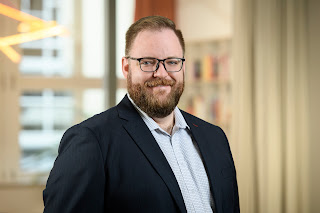HNC alumnus shapes the conversation on EU-China trade relations
Jacob Gunter (MAIS '17) has recently started work as a Senior Analyst at the renowned Mercator Institute for Chinese Studies (MERICS) in Berlin, Germany. Prior to his role at MERICS, an internship taken during his time at the Hopkins-Nanjing Center inspired Jacob to pursue a full-time opportunity at the European Chamber of Commerce in Beijing.
Tell us more about your career and current role. How much have you built upon your HNC experience, and how much did you have to learn on the job?
My career started in the summer between my first and second year at the Hopkins-Nanjing Center, when I did an internship at the European Chamber of Commerce in Nanjing. Ultimately, I wrote the local position paper, which was an analysis of the local business environment for European companies and recommendations for things to improve. That was really well received. Afterwards, I heard from the Beijing office, and shortly before graduation, I got a job offer from them which I accepted. As part of the policy and communications department I was the lead pen and researcher for the publications of the European Chamber of Commerce in Beijing, and also handled media work and talking points and communications. The foundation of knowledge that I built up at the HNC about how Chinese society and government works were really instrumental in helping me to then grapple with the Chinese economy, and how the government approaches regulation and market access for foreign investments.
When I started in August 2017, I had a kind of “trial by fire” when one of my first assignments was to write about the planned revisions to China's Negative List for Foreign Investment. I remember thinking, "I have no idea what a negative list even is." Everyone is going to feel like that, but the fundamental knowledge that you build at the Hopkins-Nanjing Center, plus your intercultural skills and your language skills are going to allow you to navigate that. For me, contextualization of the things I didn’t know about was able to happen really quickly because of the HNC. Throughout my four years of working there I developed a lot of knowledge, but also self confidence in being able to understand and explain to other people about European experiences and the challenges of doing business in China. While working at the Chamber, one of the last big publications that I led was a joint report with MERICS on US-China decoupling and what that meant for European companies. It went so smoothly, and it had always been my dream to work at MERICS. A few months after we published the report, I reached out saying I was interested in any opportunities, and lo and behold, a few weeks later we were in talks. In any of these contexts, being able to say, "I have 10 years of experience in China," and "I did my master's degree in China in Chinese," immediately cements the legitimacy of whatever I'm about to say to people who are not experts on China. They know they're not just meeting with some random academic who studied China from somewhere else, and has never really lived or worked there. People listen, and I wouldn’t have been able to give those credentials if I hadn’t gone through the HNC.
How often do you use Chinese in your current position or other skills you gained while studying at the HNC?
What was your favorite HNC course?
It’s a toss-up between Hua Tao’s Social Issues of China's Modernization course and Cai Jiahe’s Contemporary Chinese Foreign Policy class. There was so much I gained from both of those classes. The thing I liked most about them was that both of those professors really encouraged discussion and questions. Many foreign students would sometimes lack the confidence to speak up, so they were great at pushing all of us to participate. Professor Hua Tao had the tendency to call on us throughout the course of his lecture, or we would have a presentation at the beginning of class. Although this forced us out of our comfort zone in many ways, it was a critical way to learn the content, especially considering it was taught in a second language!
What has been most fulfilling for you since your time at the HNC?
The most fulfilling thing has been getting to become part of the conversation about how China's rise will impact the world, and how the world should respond to it. When I worked at the European Chamber of Commerce in China we had a direct impact on policy, and I helped participate in those discussions. A lot of it was tiny parts of regulations, but these things can have a big impact. Sometimes we're talking about hundreds of millions of dollars worth of business opportunities.
I think both at my last job and at my current one, I have a real impact on Europe and its understanding of China, because there's just generally a huge shortage of European-China expertise. In the last few years, Europe has sort of had a realization that China is a partner for common challenges, a competitor, mostly in the economic realm, and a systemic rival in other areas. But as a result, more and more frictions are starting to emerge in European-Chinese relations, coupled with the lack of expertise on China. There's huge demand for anyone who knows anything about the country. It’s been great to be able to shape that discussion both to make sure that European-China policy is not naïve, but also that they're not swinging so far to the other end of the spectrum of thinking we need to do whatever we can to "stop China."
The HNC is now 35 years old. What do you see as the value of the HNC in the next 35 years?
Interview conducted by Kalina Pateva





